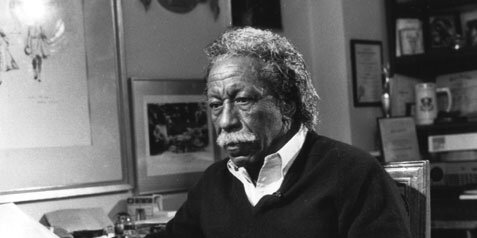MOMENTS WITHOUT PROPER NAMES offers an expressionist look at George Parks' photography
Directed by Gordon Parks
Runtime: 58 minutes
Originally released 1987
Available on Blu-Ray and DVD from Kino Lorber July 6
by Melissa Strong, Contributor
Gordon Parks (1912-2006) was a Renaissance man talented in many mediums, from photography and film to writing, music, and painting. He may be best known for directing the movie Shaft (1971) and creating moving works of documentary photojournalism with social justice themes. In many ways, Parks was an artist ahead of his times. His first film, The Learning Tree (1969, based on his autobiographical novel), was the first major motion picture with a Black director. In the 1980s, he made a film for PBS called Solomon Northup’s Odyssey based on the 1853 slave narrative that later inspired the movie 12 Years a Slave (2013). Parks also co-founded Essence magazine, published more than a dozen books, composed music for a ballet about Martin Luther King Jr., and received the Library of Congress’ “Living Legend” award.
For these reasons and more, Gordon Parks should be a household name. Unfortunately, he isn’t. Kino Lorber’s restoration of Moments Without Proper Names (1987), the last movie Parks directed, works to correct this. This release follows renewed interest in Parks’s photography. In 2015, Boston’s Museum of Fine Arts exhibited his extraordinary, criminally underseen Back to Fort Scott photographs. Then in 2018-2019, the National Gallery of Art in Washington, D.C. staged an exhibition of Parks’s early work for clients including the Farm Security Administration and Standard Oil as well as Vogue, Life, and Ebony.
Moments Without Proper Names makes Parks makes himself the subject, tracing his development as a person and an artist through an hourlong, non-narrative abstract self-portrait that combines Parks’s photographs with his musical compositions and scenes from his films. It also features footage of Parks, plus interpretations of his personal reminiscences performed by actors Avery Brooks, Roscoe Lee Browne, and Joe Seneca. The rerelease pairs the film with bonus features including producers’ audio commentary, a 1973 interview with Parks, and a short film called Flavio (1964) that he directed.
The film begins with the sound of a bell tolling in time with the appearance of pieces of an image. The fragments eventually form a portrait of Parks, and they symbolize the episodic yet holistic approach of Moments Without Proper Names. A voiceover then introduces Parks, followed by statements of the artist’s philosophies of photography and life. We see him writing on a typewriter with a pipe in his mouth before the scene cuts to Parks riding through a prairie on horseback, still smoking the pipe. Along with the viewer, he travels back to his origins in Kansas, a place of natural beauty as well as harsh conditions: tornadoes, desolate winters, racism, fear, and violence.
These themes parallel The Learning Tree, establishing a framework for Moments Without Proper Names as it riffs on Parks’s latter two memoirs, A Choice of Weapons and A Hungry Heart. The middle section resembles a jazz poem that captures the frenetic vibrance of Harlem, the overt racism of the mid-twentieth century, and the musical and cultural contributions of Parks’s hero Duke Ellington, whom he regarded as synonymous with jazz. Later, the film addresses King and Muhammad Ali, as well as the pre-BLM legacy of the Black Revoution, which Parks regarded as “shipwrecked” by a “punishing white sea.” It also touches on the Vietnam War, in which Parks’s son David served, and the story behind one of the photographer’s most well-known images before returning to Kansas to contemplate mortality and his own legacy.
Seeing the photography exhibits at both the MFA and the National Gallery made me a devotee of Parks and perhaps the ideal audience for Moments Without Proper Names. The film is a fascinating look at the works and ideas of a visionary Black artist who was one of the most important photographers of the twentieth century. There are echoes of James Baldwin in many of Parks’s observations and experiences, but the camera, not the written word, was his primary tool of social consciousness. That said, the music in Moments Without Proper Names sounds dated, and its expressionistic style doesn’t do justice to Parks unless you already know his work. If you don’t, his photographs are the best place to start, and many are on view on the Gordon Parks Foundation website.



